The idea that Shakespeare was a secret Catholic, and put coded messages into his plays about the Faith, is so attractive to me as a Catholic and a lover of Shakespeare that I have to be careful about confirmation bias. However, as I've noted before on this blog, Clare Asquith (in Shadowplay) and others have made a very serious historical case for it. Once you see it, you can't look at the plays in quite the same way again.
Shakespeare was writing at a time when pomp and ceremony in the liturgy were under intense attack. It had been stripped down to the bare minimum in the Anglican liturgy, and even that was too much for the Puritans. Yet this is what he wrote about a fantasy, ideal liturgy, in Ancient Delphi. The ambassador Dion speaks, in A Winter's Tale.
I shall report,
For most it caught me, the celestial habits,
Methinks I so should term them, and the reverence
Of the grave wearers. O, the sacrifice!
How ceremonious, solemn and unearthly
It was i' the offering!
A common theme in the plays is the murder near or before the beginning of an old king, in the course of some kind of revolution. What kind of revolution had turned Shakespeare's world upside down within living memory? Well, what sort of king was it? What attitude does the ghost of 'Old Hamlet' evoke in his viewers?
We do it wrong, being so majestical, to offer it the show of violence.
The doomed King Duncan in Macbeth combines humility with angelic power:
Besides, this Duncan
Hath borne his faculties so meek, hath been
So clear in his great office, that his virtues
Will plead like angels, trumpet-tongued, against
The deep damnation of his taking-off;
And pity, like a naked new-born babe,
Striding the blast, or heaven's cherubim, horsed
Upon the sightless couriers of the air,
Shall blow the horrid deed in every eye,
That tears shall drown the wind.
What has been kept safe in a private chapel for twenty years, in A Winter's Tale? Something to look at: a holy statue, which comes to life.
Let no man mock me,
For I will kiss her.
PAULINA
... Shall I draw the curtain?
LEONTES
No, not these twenty years.
PERDITA
So long could I
Stand by, a looker on.
Again: 'It is required
You do awake your faith'
Shakespeare, like all of his contemporaries, lived surrounded by the imposing ruins of Catholic religious houses. He did not view them with triumph or contempt. They suggested to him, rather, what would once have taken place within them. (Sonnet 73):
Bare ruin'd choirs, where late the sweet birds sang.
What we have in the Traditional liturgy of the Church is something we can see and, particularly when sung, hear. It is above all majestic, it fills us with awe, but it is something also gentle, comforting, and sustaining. It compels us to look within ourselves and repent of our sins, with a combination of fearfulness, piteousness, and confidence in God's mercy, which can more easily be experienced than described: though Shakespeare does a pretty good job.
And we have that liturgy still, in spite of all revolutions: still largely hidden, but there for those who seek it out.
(Photos: High Mass for the feast of the Immaculate Conception, SS Gregory & Augustine's, Oxford.)
Support the work of the LMS by becoming an 'Anniversary Supporter'.
You do awake your faith'
Shakespeare, like all of his contemporaries, lived surrounded by the imposing ruins of Catholic religious houses. He did not view them with triumph or contempt. They suggested to him, rather, what would once have taken place within them. (Sonnet 73):
Bare ruin'd choirs, where late the sweet birds sang.
What we have in the Traditional liturgy of the Church is something we can see and, particularly when sung, hear. It is above all majestic, it fills us with awe, but it is something also gentle, comforting, and sustaining. It compels us to look within ourselves and repent of our sins, with a combination of fearfulness, piteousness, and confidence in God's mercy, which can more easily be experienced than described: though Shakespeare does a pretty good job.
And we have that liturgy still, in spite of all revolutions: still largely hidden, but there for those who seek it out.
(Photos: High Mass for the feast of the Immaculate Conception, SS Gregory & Augustine's, Oxford.)
Support the work of the LMS by becoming an 'Anniversary Supporter'.
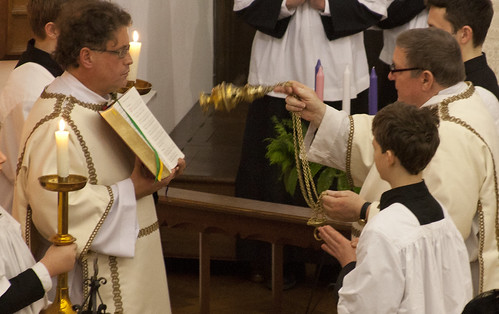
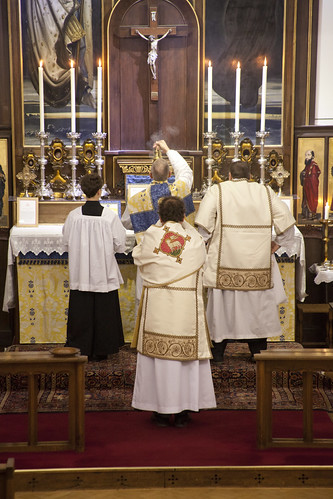
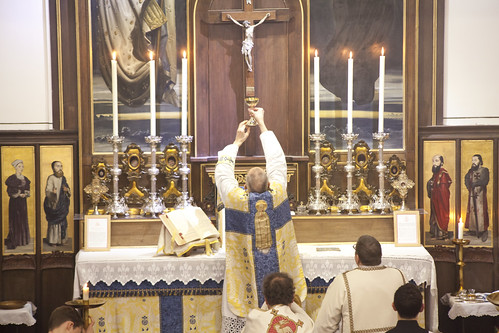
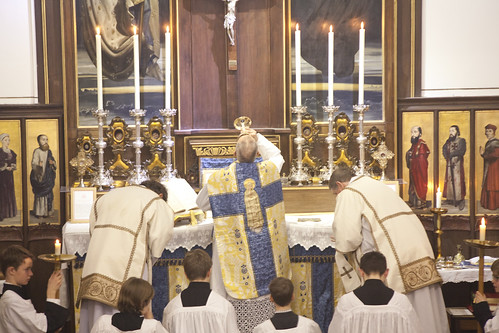
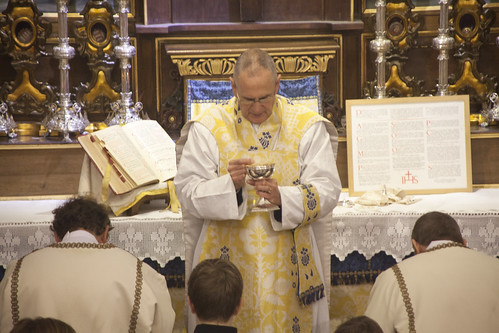
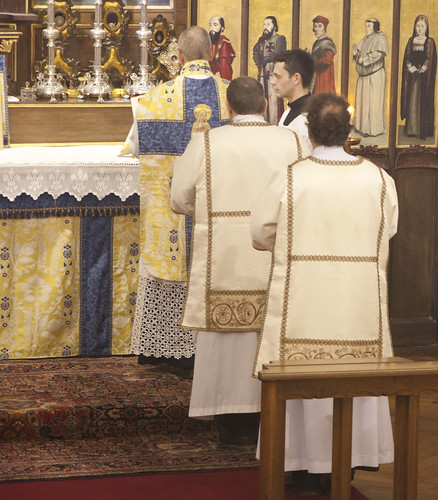
Great writing indeed Joseph.Yes we have it -The Traditional Latin Mass in all its beauty.Let us pray that it grows great again and is instrumental in converting Heathen England again!!
ReplyDeleteIt may be a touch risqué for this blog, so apologies in advance, but there's a passage from DH Lawrence's 'Women in Love' which always make me think of the TLM:
ReplyDelete'Ursula was with Birkin, she had just come into life, here in the high snow, against the stars. What had she to do with parents and antecedents? She knew herself new and unbegotten, she had no father, no mother, no anterior connections, she was herself pure and silvery, she belonged only to the oneness with Birkin, a oneness that struck deeper notes, sounding into the heart of the universe, the heart of reality, where she had never existed before.'
It's isn't Ursula's conclusions which are important here so much as her for longing for an encounter with what's Real and True - 'the heart of reality', 'the heart of the universe', somewhere 'she had never existed before.'
People today, very much including myself, are searching frantically for this level of meaning and connection. But the culture we're surrounded by militates actively against the very existence of such categories.
A person (I've known many over the years) might them turn to the Church, only to find the Mass oddly flat and disappointing - cluttered and banal - not what they hoped for or needed.
What they need, in short, is the TLM. In its silence, historical resonance, and single-pointed focus, it creates a space where that encounter with the Real - an encounter which, as Dr. Shaw says, is both intimate and majestic - can take place. Not with a human lover a la Birkin, but the One who stands above and beyond the Self and its emotional hall of mirrors, offering absolution, peace, and that great Love which we all crave and which Dante claimed moved the Sun and all the other stars.
Yes that is absolutely right. I've explored this idea also in the context of the New Age.
Delete". . . . only to find the Mass oddly flat and disappointing - cluttered and banal . . . . " The true reality of the Mass in the usual parish Novus Ordo church is hidden beneath noise and clamour and cheap raiment. So sad. But Satan smiles as the faithful leave.
ReplyDelete